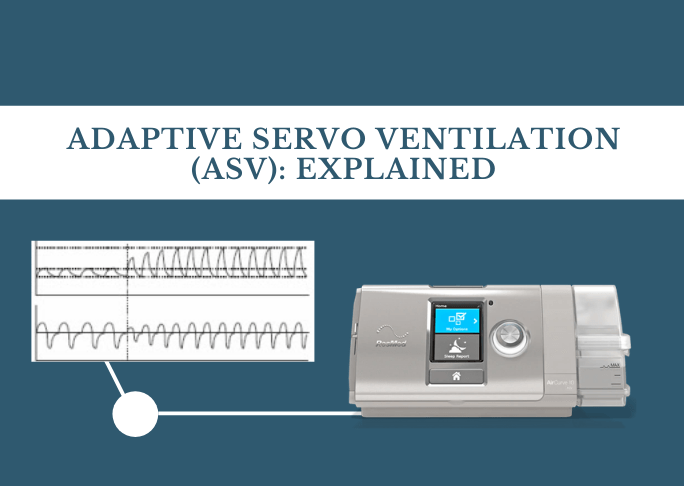
What is Adaptive Servo-Ventilation?
If you have sleep apnea, you might have heard about adaptive servo-ventilation. What is adaptive servo-ventilation (ASV), though? And how is it used to treat sleep apnea? Today we will answer these question and dive further into the topic of ASV and its implementation in sleep apnea therapy.
Adaptive Servo-Ventilation (ASV) is a type of non-invasive ventilation used to treat patients with central sleep apnea. ASV is also used to treat patients with mixed and complex sleep apnea as well as Cheyne-Stokes. As a central sleep apnea treatment method, ASV dates back to 1998, when it was introduced as a method to treat the condition while continuously monitoring the patient’s breathing pattern.
Sleep apnea is one of the most debilitating modern day sleep disorders. ASV has been widely utilized in treating patients with the central type.
The main pros of adaptive servo-ventilation
Adaptive Servo-Ventilation comes with several pros when applied in the treatment of central sleep apnea. In addition, an ASV device is especially beneficial to patients with complex sleep apneа mainly because of its capability to deliver variable flow upon demand. ASV sleep apnea machines are also used to treat obstructive sleep apneas as well.
Compared to standard PAP devices, ASV machines auto adjust to respond to the sleeper’s changing breathing patterns in the events of central sleep apneas. This helps patients to breathe easier throughout the night and ensure that they are getting an adequate supply of oxygen during therapy.
ASV Device Example:
Cons of adaptive servo-ventilation
ASV therapy may not be the most suitable choice of treatment for some patients with symptomatic heart failure. That’s why adaptive servo-ventilation therapy must always be prescribed after proper testing and diagnosis of the particular type of sleep apnea and patient.
ASV treatment is not recommended for patients with the following health conditions:
- Chronic hypoventilation;
- Moderate to severe chronic COPD;
- Restrictive thoracic disease;
- Neuromuscular disease;
- Chronically elevated partial pressure of carbon dioxide (PCO2);
- Arterial blood gas greater than 45 mm Hg.
CPAPs with ASV Modes
Adaptive servo-ventilation is a form of positive airway pressure therapy (PAP). The method automatically adjusts the delivery of air pressure to the patient according to how many pauses in the breathing are detected during sleep.
Sleep apnea devices (CPAP and BiPAP) with ASV modes rely on complex computer algorithms to adjust the pressure throughout the therapy cycle. In that regard, adaptive servo-ventilation “starts” the patient’s breathing only when required. These sleep apnea devices use the same accessories (tubes, masks) as standard non-ASV units.
What differentiates ASV in central sleep apnea treatment–as compared to standard OSA treatment–is its ability to quickly stabilize the breathing pattern and control arterial blood gases. ASV treatment is also more efficient at reducing patient discomfort caused by BiLevel sleep apnea therapy, while delivering the same personalized ventilation.
CPAP and BiPAP Treatment vs ASV
Along with adaptive servo-ventilation, there are two other widely used treatments for sleep apnea: CPAP and BiPAP therapy. These are the most often prescribed treatments for OSA, because they work and actually help the sleep apnea suffer to not only better their nighttime sleep but also completely eliminate the symptoms and improve their general health.
CPAP provides a single continuous pressure therapy while BiPAP provides two separate pressures upon inhalation and exhalation. ASV auto adjustment the pressure setting, and there is no pre-set number of pressures used in addressing central sleep apnea.
CPAP treatment is usually the first treatment prescribed for sleep apnea, then BiPAP. ASV may be considered next if the other treatments don’t prove as effective as usual.
It is of the utmost importance to consult a doctor if you suffer from sleep apnea and require treatment! The decision whether to put you on CPAP, BiPAP or ASV treatment is entirely up to your doctor and proper diagnosis.